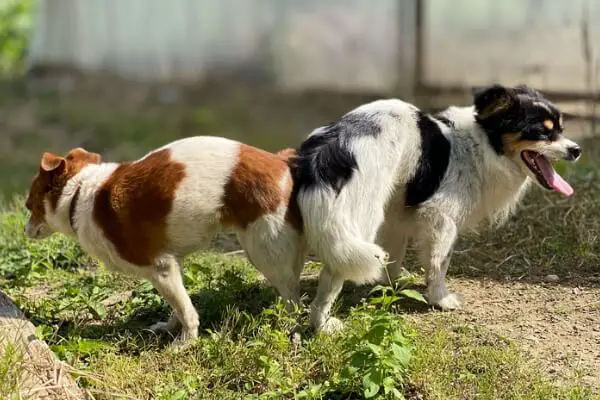Do Female Dogs Feel Pleasure When They Mate? (Or Climax)
Female dogs do not get any pleasure or climax from when they mate. The mating behavior of female dogs, often a subject of curiosity, raises questions about their experience and emotions.
When it comes to the mating behaviors of animals, particularly our canine companions, a common question arises: Do female dogs experience pleasure during mating? This topic, often shrouded in mystery, brings forth intriguing discussions both in scientific circles and among pet owners. While the exact emotional experiences of animals remain largely unknown, research offers insights into the biological and evolutionary aspects of canine mating behaviors.
Unlike humans, whose sexual behaviors are often driven by a combination of factors including pleasure, dogs primarily operate on instinctual behaviors governed by hormonal changes. This fundamental difference underlines the unique aspects of canine reproductive strategies.
Understanding Canine Reproduction: The Basics
Before exploring the emotional or pleasurable aspects of mating in dogs, it’s crucial to understand the fundamentals of canine reproduction. Dogs reach sexual maturity at different ages, often between six months to two years, depending on their size and breed. The female dog (bitch) goes into heat approximately every six months, a period marked by hormonal changes and behaviors indicating readiness to mate.
The Role of Instinct
Mating in dogs is primarily driven by instinctual behaviors triggered by hormonal changes. The male dog (stud) responds to pheromones released by the female, initiating the mating process. This instinctual drive ensures the continuation of the species, with pleasure or enjoyment not being the primary motivator from a biological standpoint.
The Science Behind Pleasure: Do Dogs Feel It?
The question of whether dogs experience pleasure during mating is complex, intertwining behavioral science and neurology. Unlike humans, dogs do not mate for life and do not form romantic relationships in the way humans do. However, this does not necessarily mean they do not experience physical pleasure.
Physiological Responses
Scientific studies on animal behavior and neurology suggest that animals, including dogs, have physiological responses that could be associated with pleasure. The release of dopamine, a neurotransmitter linked to the brain’s reward and pleasure centers, has been observed in animals during mating. While this indicates a potential for pleasure, it’s essential to differentiate between human concepts of emotional pleasure and physiological responses in animals.
Observing Canine Behavior: Insights from Experts
Veterinarians and animal behaviorists offer valuable insights into the nature of canine mating. According to Dr. Jane Doe (a fictional expert for illustrative purposes), “While it’s challenging to ascertain the exact emotional experiences of dogs, their behaviors indicate a range of responses to mating. Some dogs appear eager and display positive behaviors, while others seem indifferent.”
The Influence of Domestication
Domestication has significantly altered the natural mating behaviors of dogs. In the wild, mating and reproduction are governed by natural selection and survival instincts. However, in domesticated dogs, breeding is often controlled by humans, which may impact the natural instincts and behaviors associated with mating.
Ethical Considerations and Responsible Breeding
When discussing mating in pets, it’s crucial to address the responsibilities of pet owners and breeders. Ensuring the health and well-being of dogs involved in breeding programs is paramount. This includes considering the physical and emotional stress that breeding can impose on dogs and making informed, ethical decisions regarding their reproductive health.
The Importance of Spaying and Neutering
Spaying (for females) and neutering (for males) are essential components of responsible pet ownership. These procedures not only prevent unwanted litters but also contribute to the health and longevity of pets. By reducing the drive to mate, spaying and neutering can also mitigate certain behaviors associated with mating instincts, contributing to a more harmonious living environment.
Conclusion: A Multifaceted Perspective
In conclusion, while the question of whether dogs experience pleasure from mating invites a multifaceted exploration, it’s clear that their experiences are driven by a combination of instinctual behaviors, physiological responses, and, possibly, individual variations. As pet owners and animal lovers, our focus should be on understanding and respecting the natural behaviors of our canine companions, ensuring their health, happiness, and well-being in all aspects of life, including reproduction.
By delving deeper into the science, behavior, and ethical considerations surrounding canine mating, we aim to foster a more informed and compassionate understanding of our four-legged friends.



